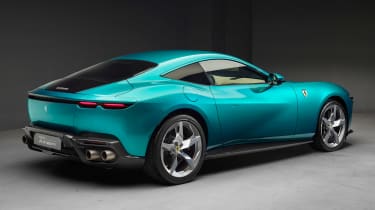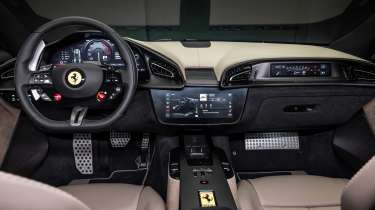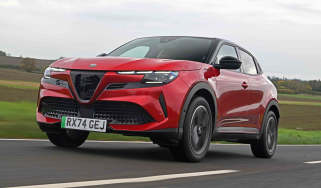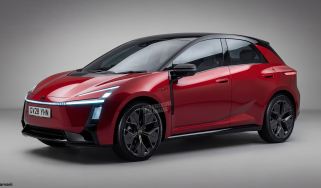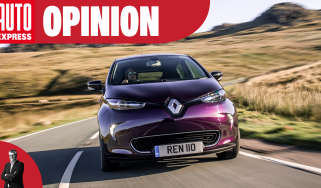Arrivederci Roma: new Ferrari Amalfi slots in as brand’s latest entry-level model
A slick new look and more power are the headlines for Ferrari’s new baby, but it’s probably some simple new buttons that will get customers’ attention
The entry-level model in Ferrari’s range has undergone a heavy update, with the Roma turning into the Amalfi. While two cars are fundamentally similar in layout and hardware, the new Ferrari Amalfi sharpens the Roma’s edges – and just in time to face a set of new rivals from Aston Martin, Bentley and Porsche.
According to Ferrari, the changes are so significant that a name change was required. At first glance, it seems like a reasonable claim, because the front end has been completely redesigned with a fresh face that draws a closer connection to the Purosangue than its more classical GT forebears.
Hidden away in a tight opening sit the LED headlights, topped by an LED lightbar and a small intake above. Within the black bar between them are some of the car’s sensors, but the main radar still sits prominently below.
The lower grille is now one large wraparound opening covered in a delicate mesh, and while they might not look it, both the bonnet and the front wings are new with crisper lines and less rounded volumes. Yet although every metal body panel is new, the Amalfi’s fundamental structure is the same as the Roma’s, with the windscreen and front windows shared with its predecessor.
At the rear, the Roma’s somewhat bulbous styling has given way to a more technical look reminiscent of the 12Cilindri. The twin-element lights now sit in a hollowed-out ledge, which also houses the boot release. Just above, there’s a small active wing that’s capable of producing up to 110kg more downforce than the unit on the Roma in its most aggressive position.
Interior, tech and infotainment
More substantive changes have been made in the cabin, though, thanks to a new dashboard and centre console that give the feeling of more space without actually increasing any of the hard dimensions. The main new element is a central bridge that bisects the front two seats, replacing the Roma’s more stylised console. And while many buyers will specify this in carbon fibre, the standard fixture is a solid piece of anodised aluminium that’s milled from a single block, adding to Ferrari’s superb roster of high-quality leathers, carbon and Alcantara.
The very tight rear seats are as before, and as in most rival cars, are only suitable for small children. Behind these, the reasonably sized 273-litre boot will swallow a couple of carry-on suitcases. If you want to fit a set of golf clubs in there, you’ll have to drop the rear seats.
Ferrari says it has listened to its customers and made a few big changes to the digital interfaces. First and foremost, the haptic steering wheel buttons have been replaced with physical controls. These should make the complex menu structure in the instrument cluster easier to navigate. There’s also a physical red starter button in place of the former touch control – word has it that it was a particularly unpopular element in this era of Ferrari.
The other is a switch to a more mainstream horizontal display on the dash borrowed from the 12Cilindri. This fits underneath the new dashtop that’s also much closer in style and layout to the Amalfi’s sibling, delivering a more open feeling to the cabin than the Roma’s tighter, more intimate design.
Chassis, engine and power
Under the new skin Ferrari has focused on widening the remit of the existing hardware through a couple of new technical features. The first is a new ECU which is able to better integrate all the various chassis systems, while the new braking system should see a breakthrough in terms of feel and consistency, it’s claimed. Other elements including the springs and dampers have also been replaced, giving the Amalfi a greater range of abilities between sports car and GT than the Roma.
The heart of any Ferrari is its engine, and the existing 3.9-litre V8 has been re-engineered to produce slightly more power at 631bhp, and 760Nm of torque. This is sent through the existing eight-speed dual-clutch transmission to the rear wheels, with an electronically controlled differential helping to meter it all out.
Ferrari Amalfi rivals
These changes have come at an opportune moment, with the GT class about to be hit by a plethora of updated models. Aston Martin’s more powerful DB12 is already an impressive customer, but a new S model is only a few months away, likely packing even more power than its current 671bhp. Bentley is also working on an even faster variant of the already brilliant Continental GT Speed, and Porsche is on the cusp of introducing a new hybrid-assisted 911 Turbo at the sportier end of the spectrum.
So when the Amalfi arrives in the first quarter of next year with a starting price likely to be around £200,000, it’ll have quite the array of new rivals.
Our dealer network has 1,000s of great value new cars in stock and available now right across the UK. Find your new car…


